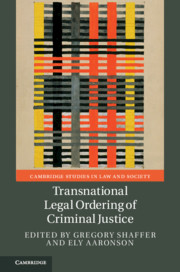Book contents
- Reviews
- Transnational Legal Ordering of Criminal Justice
- Cambridge Studies in Law and Society
- Transnational Legal Ordering of Criminal Justice
- Copyright page
- Dedication
- Contents
- Figures
- Tables
- Contributors
- Acknowledgments
- Part I Introduction
- Part II Transnational Legal Ordering and Transnational Crimes
- Part III Transnational Legal Ordering and International Crimes
- Part IV Transnational Legal Ordering and Human Rights Standards in Criminal Justice
- Chapter Nine International Prison Standards and Transnational Criminal Justice
- Chapter Ten The Transnational Legal Ordering of the Death Penalty
- Chapter Eleven Performance, Power, and Transnational Legal Ordering
- Part V Conclusion
- Index
- Cambridge Studies in Law and Society
- References
Chapter Eleven - Performance, Power, and Transnational Legal Ordering
Addressing Sexual Violence as a Human Rights Concern
from Part IV - Transnational Legal Ordering and Human Rights Standards in Criminal Justice
Published online by Cambridge University Press: 05 June 2020
- Reviews
- Transnational Legal Ordering of Criminal Justice
- Cambridge Studies in Law and Society
- Transnational Legal Ordering of Criminal Justice
- Copyright page
- Dedication
- Contents
- Figures
- Tables
- Contributors
- Acknowledgments
- Part I Introduction
- Part II Transnational Legal Ordering and Transnational Crimes
- Part III Transnational Legal Ordering and International Crimes
- Part IV Transnational Legal Ordering and Human Rights Standards in Criminal Justice
- Chapter Nine International Prison Standards and Transnational Criminal Justice
- Chapter Ten The Transnational Legal Ordering of the Death Penalty
- Chapter Eleven Performance, Power, and Transnational Legal Ordering
- Part V Conclusion
- Index
- Cambridge Studies in Law and Society
- References
Summary
This chapter connects analyses of transnational legal orders with research in field sociology and cultural sociological work on performance and power. Research on transnational legal orders opens up the opportunity to study processes of legal change that focus on status enhancement, networks, and peer review, in addition to more formal processes of legal regulation, enforcement, and compliance. We do so by focusing on human rights recommendations regarding rape and sexual violence, within the context of the UN’s Universal Periodic Review (UPR). The UPR process is uniquely suited to studying global norms, since the materials reviewed include national state reports, civil society reports, and a compiled report from international institutions – and within a peer review framework, states then respond by either accepting or merely noting the recommendations they receive. Through multiple correspondence analysis, we geometrically map out distinct groups of states involved in the process, and using a series of growth curve models, we show that recommendation acceptance is partially driven by particular types of states interacting within the UPR. In so doing, we develop connecting points between research on transnational legal orders, field sociology, and cultural sociology in order to better understand the performance of human rights.
- Type
- Chapter
- Information
- Transnational Legal Ordering of Criminal Justice , pp. 333 - 366Publisher: Cambridge University PressPrint publication year: 2020
References
- 2
- Cited by

